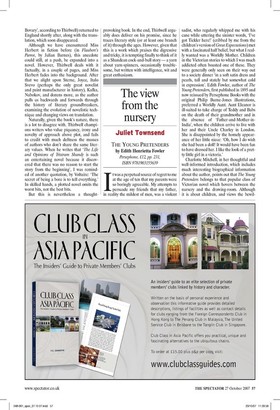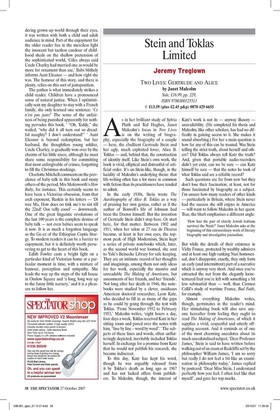The view from the nursery
Juliet Townsend THE YOUNG PRETENDERS by Edith Henrietta Fowler Persephone, £12, pp. 231, ISBN 9781903155639 1 t was a perpetual source of regret to me at the age of ten that my parents were so boringly agreeable. My attempts to persuade my friends that my father, in reality the mildest of men, was a violent sadist, who regularly whipped me with his cane while uttering the sinister words, 'I've got Tickler here!' (cribbed by me from the children's version of Great Expectations) met with a fascinated half belief, but what I really wanted was a Worldly Mother. Children in the Victorian stories to which I was much addicted often boasted one of these. They were generally only seen on their way out to a society dinner 'in a soft satin dress and pearls, tall and stately but somewhat cold in expression'. Edith Fowler, author of The Young Pretenders, first published in 1895 and now reissued by Persephone Books with the original Philip Burne-Jones illustrations, preferred a Worldly Aunt. Aunt Eleanor is ill-suited to take charge of Teddy and Babs on the death of their grandmother and in the absence of 'Father-and-Mother-inIndia', when the children arrive to live with her and their Uncle Charley in London. She is disappointed by the homely appearance of her little niece: 'Oh, how I do wish she had been a doll! It would have been fun to have dressed her. I like the look of a pretty little girl in a victoria.'
Charlotte Mitchell, in her thoughtful and well-informed introduction, which includes much interesting biographical information about the author, points out that The Young Pretenders belongs to that popular class of Victorian novel which hovers between the nursery and the drawing-room. Although it is about children, and views the bewildering grown-up world through their eyes, it was written with both a child and adult audience in mind. Part of the enjoyment for the older reader lies in the merciless light the innocent but tactless candour of childhood sheds on the shallow pretension of the sophisticated world, 'Giles always said Uncle Charley had married one as would be more for ornament than use,' Babs blithely informs Aunt Eleanor — and how right she was. The humour of this story, and there is plenty, relies on this sort of juxtaposition.
The pathos is what immediately strikes a child reader. Children have a pronounced sense of natural justice. When I optimistically sent my daughter to stay with a French family, she only learned one sentence: `Ce n'est pas juste!' The sense of the unfairness of being punished apparently for nothing pervades this book. '"Oh, Teddy," she wailed, "why did it all turn out so dreadful naughty? I don't understand!" ' Aunt Eleanor is beyond redemption, but her husband, the thoughtless young soldier, Uncle Charley, is gradually won over by the charms of his little niece, although he must share some responsibility for committing that most unforgivable of crimes, forgetting to fill the Christmas stockings.
Charlotte Mitchell comments on the prevalence of baby talk in this book and many others of the period, Mrs Molesworth's Herr Baby, for instance. This certainly seems to have been a Victorian obsession, from that arch exponent, Ruskin in his letters — 'Di wee Ma, How does oo tink me's to sist till the 22nd! Oos velly cooel' — downwards. One of the great linguistic revolutions of the last 100 years is the complete demise of baby talk — not even babies seem to speak it now. It is as much a forgotten language as the Ge-ez of the Ethiopian Coptic liturgy. To modern readers it can be a barrier to enjoyment, but it is definitely worth persevering to get to the heart of this book.
Edith Fowler casts a bright light on a particular kind of Victorian home at a particular moment in time, with a mixture of humour, perception and sympathy. She leads the way up the steps of the tall house in Onslow Square and 'a long, long way up to the funny little nursery,' and it is a pleasure to follow her.



































































 Previous page
Previous page